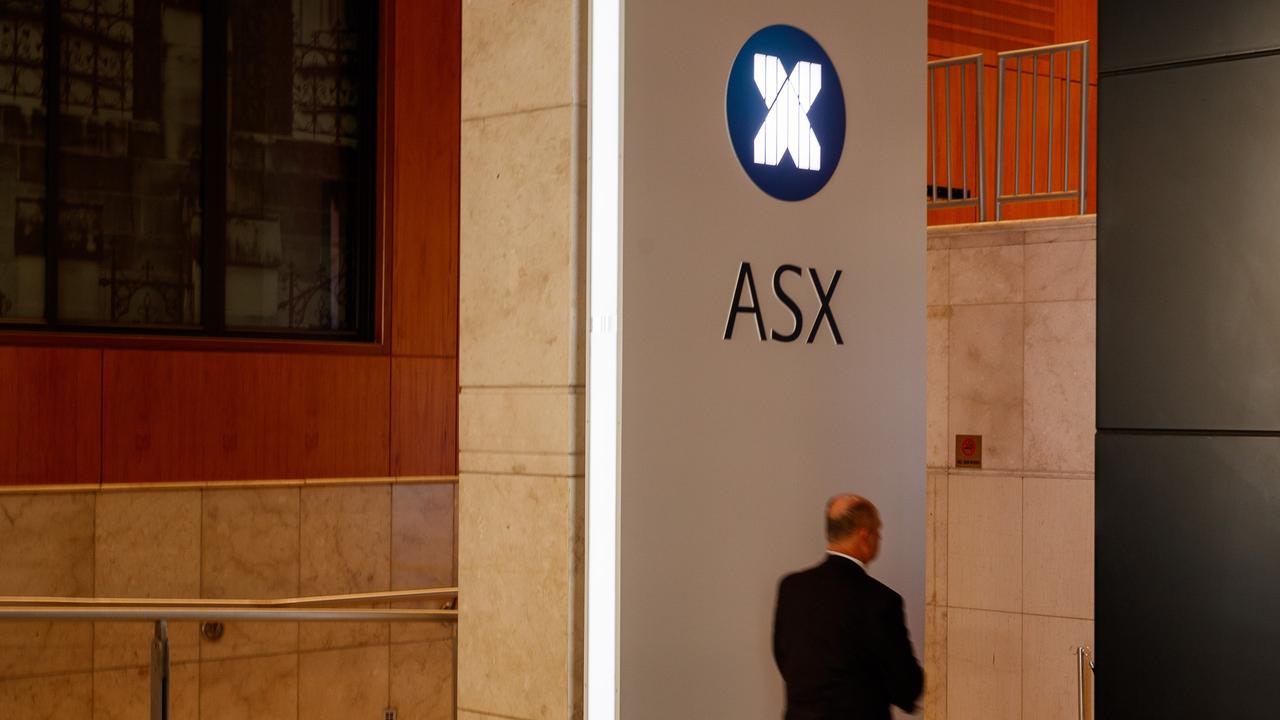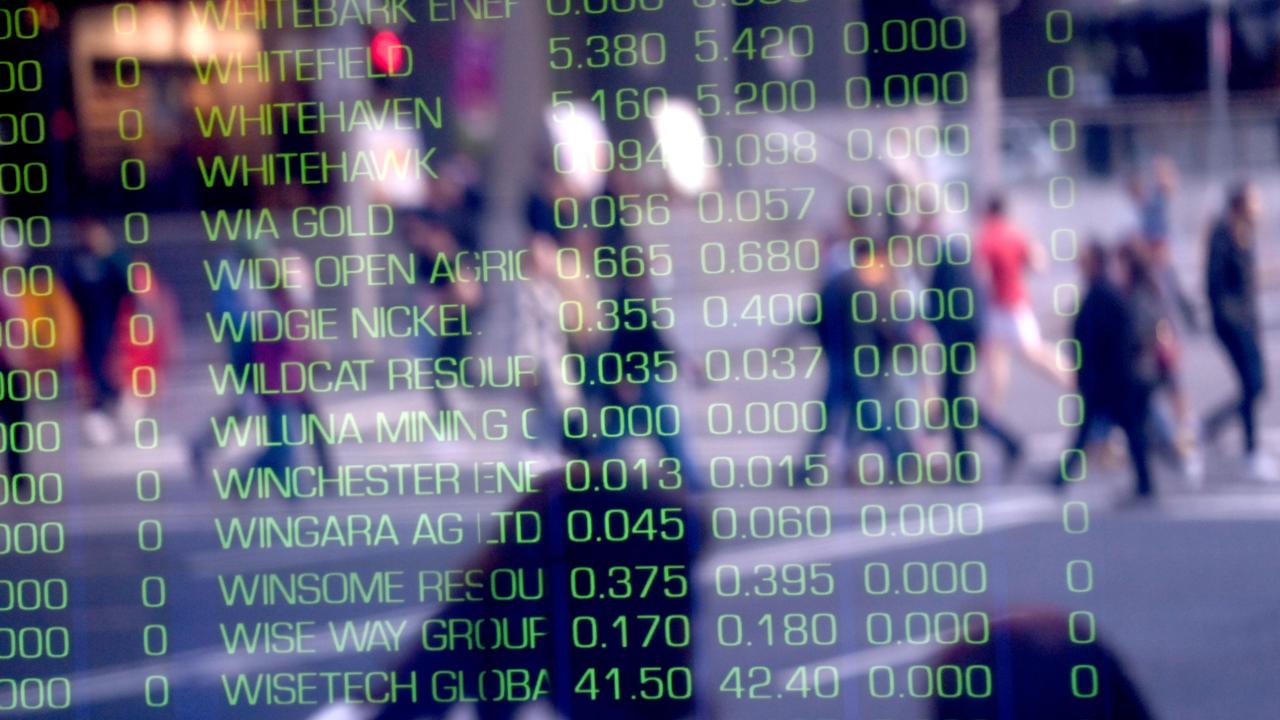ASX gains 0.6pc to cement 2pc weekly rise
A 0.6pc lift on Friday cemented strong gains for the week, as Mesoblast recouped its losses and CBA fell for a third day since its results.
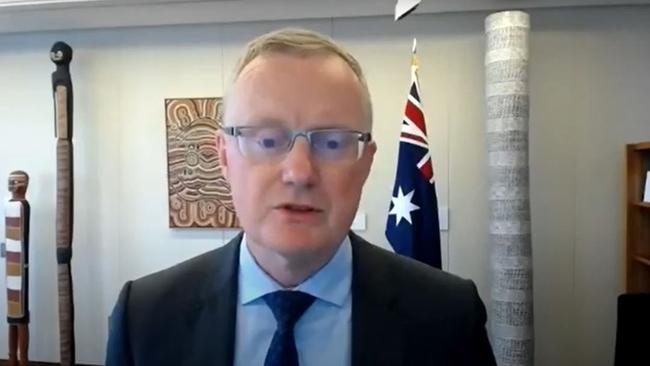
- NSW an important test case: RBA
- NAB third quarter earnings slip
- Mesoblast wins FDA panel support
- Newcrest boosts dividend as gold soars
That’s all from the Trading Day blog for Friday, August 14. The ASX finished higher by 0.6pc to cap a 2pc weekly rallyas the RBA fronted a federal parliamentary committee hearing, saying NSW’s handling of COVID-19 outbreaks was a key test case for the country.
In company news, NAB said third quarter earnings were down 7pc, while Mesoblast soared as much as 57pc after clearing a first hurdle for its coronavirus drug.
US futures suggest gains to come overnight.
Robyn Ironside 7.46pm: Sydney Airport passenger reprieve
A brief easing of domestic travel restrictions helped lift Sydney Airport’s passenger numbers in July, before state borders were snapped shut again.
Traffic data shared with the ASX, showed domestic passenger numbers totalled 276,000 for the month, up from 140,000 in June and 62,000 in May.
The figure was still down 88.5 per cent on the same time last year, but showed the “pent-up demand for interstate travel”.
Overall passenger numbers fell 91.8 per cent in July to 317,000, with international travellers totalling 42,000.
The fourth consecutive month of 90 per cent declines came as Sydney Airport completed the first stage of its $2bn equity raising, designed to help the gateway see through the COVID-19 crisis.
An institutional offer raised $1.3bn with 93 per cent of entitlements available to eligible security holders taken up.
Sydney Airport chief executive officer Geoff Culbert said they were delighted with the strong demand from institutional investors which demonstrated “belief in the long-term fundamentals” of the business.
“This equity raising will strengthen our balance sheet, ensure we are well-positioned to meet any future challenges presented by the COVID-19 crisis and gives us the flexibility to make the most of opportunities that arise through the recovery,” Mr Culbert said.
Shares in Sydney Airport closed down 1.5 per cent at $5.31 on Friday.
Robyn Ironside 5.50pm: Virgin sale ‘must go ahead’
Virgin Australia chief executive Paul Scurrah has written to employees outlining why the airline cannot afford for the sale to Bain Capital to be disrupted.
In an email seen by The Australian, Mr Scurrah said an essential element of the sale agreement was the provision of a loan to allow the airline to continue to trade until the sale was completed.
“Any delay to the administration process would mean we remain in administration for a longer period,” said Mr Scurrah.
Perry Williams 5.10pm: Santos delay on Narrabri fate
Santos faces a delay before learning the fate of its $3.6bn Narrabri gas project after the NSW Independent Planning Commission was granted an extra three weeks to assess the controversial development while a public comment process will be reopened to consider new material.
A deadline for the IPC to make a recommendation has been extended to September 30 from the original September 4 deadline following a request for more time by the independent body to the Department of Planning, Industry & Environment.
The IPC asked for extra time after a record seven-day public hearing and 10,000 submissions were received.
“The IPC sought and was granted an extension due to the complexity of the issues under consideration and the high level of public interest in the Project, which resulted in a record seven-day public hearing and approximately 10,000 submissions to the Commission,” the IPC said in a statement.
It has also been forced to re-open the public comment process after Santos produced new economic modelling on the project and the NSW Planning Department responded at length to new questions posed by the IPC.
“The Panel will only consider comments received directly from the person submitting the comment. Campaign emails, petitions or form letters will not be considered nor uploaded to the Commission’s website,” the IPC said, noting a new deadline of August 21 for public comments.
Written submissions had previously closed on August 10.
Santos submitted its environmental impact statement for Narrabri in February 2017 to the NSW Department of Planning and has been frustrated over the long-winded regulatory hurdles, arguing the development could help ease the tight east coast market.
The 850-well proposal receiving a record 23,000 submissions on its environmental impact statement with 98 per cent opposed to the project although about a third of local submissions supported the development, the Department of Planning said.
The facility received sign-off from the NSW government in June with the IPC process the final hurdle faced by the gas producer.
Santos has previously referenced the NSW Chief Scientist’s 2014 inquiry into coal seam gas concluding the fossil fuel can be safely extracted from coal seams with the right safeguards and controls.
Santos said it was “disappointed that a decision on the project has been delayed, however, no one can now say they have not had ample opportunity to have their say on the project.”
4.37pm: Health soars as CBA extends losing streak
Health gains were a key support for the market on Friday, as Mesoblast soared as much as 57 per cent after passing the first hurdle in having its COVID-19 treatment cleared by US regulators.
Shares in the biotech have had a rocky week in anticipation of the outcome, but finished the session up 39 per cent to $4.70 – still below trading levels at Monday’s close.
Elsewhere in the health space, heavyweight CSL finished with a 0.6 per cent lift to $279.34 while Cochlear added 0.9 per cent to $199.77.
NAB outperformed with a 1.2 per cent gain to $18.22 after handing down a better-than-expected third quarter update, with cash profit down 7pc but margins relatively stable.
Westpac followed suit with a 0.5 per cent boost to $18.04, while ANZ lifted by 0.8 per cent to $18.68.
Commonwealth Bank on the other hand took a 0.9 per cent slip to $71.76, its third down day after releasing its full year results on Wednesday.
Here’s the biggest movers at the close:
4.14pm: Tech, health drive 0.6pc lift
Strength in health and tech stocks sent the ASX up 0.6 per cent on Friday, cementing the benchmark’s biggest weekly lift since the start of July.
After a shaky start the benchmark ASX200 built to a gain of 35 points or 0.58 per cent to 6126.2 at the close, marking a 2 per cent weekly gain – the biggest lift in six weeks.
On the All Ords, shares gained 38 points or 0.61 per cent to 6261.7.
3.22pm: Credit Suisse, Jarden end alliance
Credit Suisse Australia and New Zealand brokerage Jarden have ended their formal strategic alliance, citing “the evolving strategic priorities of both firms”.
“We wish Jarden all the best. We have a long history between us and we look forward to the opportunity to work together in the future,” said Credit Suisse Australia CEO, Richard Gibb.
“Credit Suisse has been a great partner for Jarden and we also look forward to continuing to work on transactions and initiatives that can mutually benefit our clients,” said Jarden CEO, James Lee.
The two companies said there will be “an orderly transition” over the coming six months.
Sources with knowledge of the matter say the split was due to Jarden’s aggressive build out in Australia and it will free Credit Suisse to beef-up its distribution and investment banking deals in New Zealand.
The longstanding relationship saw Jarden “white label” Credit Suisse research and the pair also partnered for some investment banking transactions.
Meanwhile, under the watchful eye of Credit Suisse Australia’s MD and head of equities, Mark Davis, the Bank is now second ranked for market share in Australia up from eighth just a year ago.
2.35pm: Further dovish shift emerging: RBC
Comments from the RBA Governor Phil Lowe and intense questioning at the parliamentary committee hearing this morning suggest a further dovish shift is emerging, so says RBC.
Economist Su-Lin Ong writes that Dr Lowe’s reference to “now not expecting a lift in economic growth until the December quarter” suggest the central bank is forecasting further stagnation though the third quarter.
And in addition to that, the bank made reference to a possible separate bond buying program, which could involving buying specified amounts of 5-year or 10-year bonds, “effectively large-scale asset purchase (LSAP) style and true QE in nature”.
“While reasonably satisfied with the current measures, the clear message from the Governor today was that they are prepared to do more if circumstances change and they believe doing more will be impactful,” Ms Ong says.
“That could include a 5y yield target, LSAP, and negative rates. We do not doubt that the hurdle is high but the Governor’s answers under some tough questioning hints at the discussion behind RBA closed doors and highlights clearly which way the risks lie – hope for the best as evident in their central case forecasts and recovery profile but prepare for the worst.”
Read more: Aussie dollar not overvalued: Lowe
1.43pm: AMP’s simplification starting to show
Bell Potter’s banking analysts Lafitani Sotiriou has described AMP’s earnings release yesterday as a “treat filled” result, upgrading his earnings per share estimates for the next three years.
In a note following the release of AMP’s results, including a special dividend, Mr Sotiriou says the group’s simplification strategy is starting to show.
He says the special dividend, share buyback program and acquisition of the 15pc stake of AMP Capital from MUFG was all made possible due to the AMP Life sale completing on time.
“AMP is in the midst of a major repositioning of its business, but for the first time in years it’s slimmed down investor presentation (part due to a simpler business emerging), is showing a less complicated business,” he writes.
“What is left, includes growth businesses, a $300m cost-out program and attractive equity stakes in China Life Pension Company, China Life Funds Management and Resolution Life (worth around $1.5 billion in total).”
He upgrades his EPS forecasts by 5.5pc, 3.2pc and 3.9pc for FY20 – FY22 respectively, prompting a target price revision to $2.60 from $2.40.
AMP last traded up 1.6pc to $1.56.
1.28pm: ANZ sells 1300 offsite ATMs
ANZ says it had signed a deal for the sale of 1300 of its offsite Australian ATMs to Armaguard Group.
The sale comes as ATM use across the sector continues to decline as consumers move to cashless payments.
As part of the agreement, ANZ customers will continue to have fee-free access to the ATMs with Armaguard Group set to rebrand them under its new united national network brand, ANZ said.
ANZ customers will also continue to have fee-free access to thousands of additional ATMs operated by the other major banks.
The bank will continue to operate and maintain its network of around 900 ATMs located at its branches around Australia as well as some “strategically important” offsite ATMs.
ANZ said the sale was another step in its push to simplify the business and its Australian Retail and Commercial operations in particular. The ATMs are expected to start transferring to Armaguard Group during 2021.
RBA figures show $8.56bn was withdrawn from ATMs in June. While this rebounded from May $7.48bn it was the lowest level since January 2001.
1.01pm: Shares extend gains to 0.5pc
Shares are trading at their best levels of the day at 1pm, supported by a 38pc surge in Mesoblast and lift in NAB after its third quarter update.
At half time, the ASX200 is higher by 33 points or 0.54 per cent to 6123.6.
NAB’s third quarter earnings beat estimates, helping its shares up by 0.9pc to lead the financials. Westpac and ANZ are both up by 0.4pc while Commonwealth Bank takes a 1.2pc hit to $71.57.
Here’s the biggest movers at 1pm:
12.27pm: JobKeeper has done its job: Lowe
RBA Governor Lowe is questioned on the JobKeeper program, and the potential for support payments to flow through to shareholders in the form of dividends.
“The JobKeeper program is about keeping people in jobs, and it had done a remarkably good job,” he says.
“We want out businesses to be profitable, and it is up to individual businesses as to what they do with those profits. What companies do with profits is a matter for those companies and their boards.”
He says he hasn’t seen evidence of rorting of the support payments, adding that he would be concerned if he did.
12.15pm: COVID-19 could exacerbate risk aversion
As the parliamentary committee hearing draws to an end, Dr Lowe takes questions on the economy’s dynamism.
He notes that young people are paying the price to keep the rest of the country safe, with retail and hospitality sectors most exposed to the lockdown.
He adds that a slowdown in economic dynamism pre-COVID could be exacerbated by the current circumstances.
“If the economy is less dynamic or less innovative, it catches up with us with a slower growth rate,” Dr Lowe says.
“COVID-19 could reinforce those trends because it makes us less willing to take risks.”
Adding to that, he adds that culturally there needs to be a shift to encourage innovation.
“If every time you make a mistake you flog people in the public square they will be more risk averse.”
12.11pm: China retail sales disappoint
China’s monthly economic data show recovery continues albeit with disappointing retail sales.
July retail sales fell 1.1pc month-on-month, undershooting a 0.1pc rise expected by economists.
Industrial production rose 4.8pc, just a touch weaker than Bloomberg’s 5.2pc consensus estimate, while fixed assets investment matched expectations of a 1.6pc fall.
Markets are taking the data in their stride with the S&P/ASX 200 index up 0.4pc at 6115 after early gains and the Australian dollar down 0.2pc at 0.7137.
12.00pm: Annual overseas arrivals down 28pc
Strict travel restrictions in the second half of the year pulled annual Australian arrivals down 28 per cent in the past year, the lowest since 2013-14.
In the latest data from the ABS, overseas visitor arrivals for the year dropped to 6.74 million, with near 100pc drop off from April.
Prior to the COVID-19 threat, the nation set a record with 9.5 million visitors for the year ended January 2020.
During 2019-20, New Zealand was the largest source country with over 1 million visitors, followed by China (900,000) and the USA (581,000).
Further detail shows just 60 arrivals came in on a student visa in June – a drop of 45,980 or 100pc compared to the same time in the previous year.
| 2019-20 | ‘000 | % CHANGE |
| Jul | 790.4 | 2.1 |
| Aug | 789.2 | 6.4 |
| Sep | 695 | 0.7 |
| Oct | 774 | 2.7 |
| Nov | 815.9 | 1.7 |
| Dec | 1077.7 | 1.9 |
| Jan | 766.6 | 4.8 |
| Feb | 685.4 | -26.1 |
| Mar | 331.9 | -60.3 |
| Apr | 2.2 | -99.7 |
| May | 3.4 | -99.5 |
| Jun | 5.4 | -99.2 |
| Annual Total | 6737.2 | -27.9 |
11.36am: Aussie dollar not overvalued: Lowe
After a brief break at the parliamentary committee hearing, Dr Lowe takes questions on the currency in reference to the current strength in the Aussie dollar.
“I would like the currency to be lower,” he says.
“I think that would help the economy and create more jobs and lift inflation a little bit … I cant say the dollar is overvalued.”
Further, he acknowledges the strength of commodity prices and says Australia has managed the crisis better than most economies.
AUDUSD last down 0.1pc to US71.40c.
Nick Evans 11.17am: Newcrest boosts dividend as gold soars
Newcrest Mining will pay an improved full-year dividend on the back of the soaring gold price after booking a $US647m net profit, up 15 per cent, even after spending $US1.3bn on growth options for future years.
Australia’s biggest gold miner will pay a US17.5c a share final dividend on the back of the result, up from US14.5c a year ago, after booking earnings before interest, tax, depreciation and amortisation of $US1.8bn, and before-tax earnings of $US1.2bn.
Its results were affected by its $US769m acquisition of the Red Chris mine in Canada, and the $US460m acquisition of financing facilities of Lundin Mining’s Fruta del Norte mine, along with the $US79m it spent increasing its stake in Lundin to a 32 per cent shareholding.
Still, shares are lower by 1.1pc to $34.10.
Read more: Newcrest lifts payout, profit
11.06am: Market too optimistic on NAB: Macq
NAB’s third quarter trading update has prompted a 1.1pc jump in shares this morning, with revenue and capital levels coming in higher than market expectations.
Macquarie notes that revenue growth of 10pc was head of its own expectations, though it says the jump was predominantly driven by volatile market and trading income.
The broker adds that a tick higher in expenses over the quarter could be a catalyst for the revision of FY21 expense expectations, which it sees as “unrealistic”.
“While we expect the market to see NAB’s 3Q20 trends positively and are supportive of NAB’s long-term thesis, we remain concerned with the risks stemming from deteriorating credit quality that is likely to impact NAB’s performance in FY21,” the broker says.
“We continue to see consensus expectations around impairment charges as too optimistic and while NAB’s CET1 ratio appears sound, we note that this is needed to absorb the rising risk-weighted asset density stemming from deteriorating credit quality.”
NAB shares are higher by 1.1pc to $18.20 – outperforming the rest of the majors.
Read more: NAB quarterly cash earnings slip 7pc
10.56am: Argument for extending insolvency support: Lowe
In further questions from the house parliamentary committee, Dr Lowe says there is an argument for extending the support for insolvencies beyond the September cut off.
“We do need to face the reality that some businesses will go bankrupt as we face the biggest economic contraction in 100 years,” he says.
“It's the unfortunate reality. It is important that support measures in place, and its important that they are gradually wound down as opposed to falling off a cliff.”
10.54am: 5-year bond target possible: Lowe
RBA Governor Philip Lowe says it’s possible the RBA could buy 5 and 10-year bond yields if it would help the employment outlook but he stresses that Australia is not at that point.
Asked if the cash rate could stay down near its current rate of 0.25 for 5 years he says: “I would certainly hope not. It is possible the cash rate is where it is for 5 years. I would hope that it isn’t.”
Dr Lowe adds that if he were confident that the cash rate will need to stay where it is for 5 years there would be a case for targeting the 5-year bond yield, “but let’s start with 3 years and see how it goes … I think it needs to be consistent with our view on the cash rate.”
There's been rumblings of late among some economists that the RBA might be readying to do more. I think that's been gunned down #auspol #ausecon #RBA
— James Glynn (@JamesGlynnWSJ) August 14, 2020
10.42am: Negative rates not ruled out: RBA
RBA governor Philip Lowe tells a parliamentary committee that the RBA hasn’t ruled out negative interest rates in Australia because “in the current environment it’s best not to rule anything out”, but negative rates remain “extraordinarily unlikely”.
“They would make credit supply more difficult and that would hurt jobs,” he says.
“Negative interest rates wouldn’t help jobs, they would make it worse. The consensus is that the costs of negative rates are greater than the benefits.”
In a global context, he points out that since the onset of the pandemic, no central bank that has had positive rates has cut rates to negative, and no central bank with negative rates has cut rates further negative.
10.33am: Mesoblast soars 35pc
Mesoblast shares have rocketed as much as 40pc higher in morning trade, after clearing the first hurdle for its new COVID-19 drug.
The biotech overnight got clearance by the Oncologic Drugs Advisory Committee for its therapy which was developed to treat steroid-refractory acute graft-versus-host disease, which has a similar immune response seen in patients with severe complications from coronavirus.
Jitters ahead of the meeting had put pressure on shares, prompting a 38pc sell-off earlier this week, but shares are now trading back just below Monday’s closing levels.
MSB last traded up 39.7pc to $4.72.
Read more: Aussie COVID-19 drug takes next step to approval
10.30am: Lift in super would decrease demand
RBA Governor Philip Lowe warns that any lift in compulsory superannuation would put downward pressure on demand in the economy and therefore restrain wages growth.
On a question on lending, he says he recently met with the heads of the major banks.
“It’s in no one’s interest to have widespread defaults and forced sales (of property),” he says. “I don’t have any concerns about the stability of the banking system at all.”
10.24pm: Jobs more important than credit ratings
RBA governor Philip Lowe says the States should prioritise creating jobs over preserving their credit ratings.
“Going forward the challenge is to create jobs and the state governments control most of the levers here,” he says.
“I would hope over time we would see more investment for jobs and the States have a crucial role here.
“I think preserving their credit ratings is not particularly important. I think using the public balance sheet to create jobs is more important than preserving the credit ratings. The priority is to create jobs.”
10.15am: Shares edge up by 0.4pc
Shares are edging slightly higher in early trade, shaking off offshore weakness as health care and tech stocks outperform.
At the open, the benchmark ASX200 is higher by 25 points or 0.4pc to 6116.2.
10.08am: NSW an important test case: RBA
Dr Lowe says NSW’s handling of its coronavirus outbreaks is a “really important test case” in how Australia could open up its economy and keep cases under control.
Quizzed by the committee on his views on border closures, Dr Lowe says he is closely watching the progress of NSW in keeping its economy open during the second wave and the way it manages cases through quarantine and contact tracing.
“NSW is proving to be a really important test case,” he says. “If they can manage some small community transmission … if they can make that work, then we should be able to open up the economy. Their success would give us confidence that we can keep on top of it.
“If NSW can’t make this a success, then I think we are going to face a lot more challenges. “There’s is a lot resting on the NSW approach … Let’s hope they can make it work.”
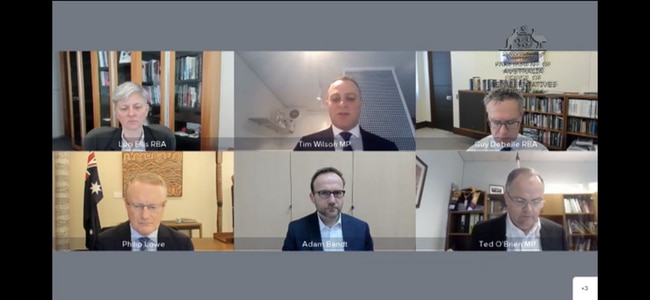
10.02am: Monetary policy reaching its limits
The RBA governor says the main policy instrument for Australia is fiscal policy, noting that the effectiveness of monetary policy was limited.
Answering a question of the parliamentary economics committee, he says, “I wouldn’t say its exhausted, but there are limits to what more it can reasonably do”.
“We could make adjustments to the package we delivered in March, but I don’t think we would get much more traction by doing so.”
9.50am: No free lunch here: RBA
RBA Governor Phil Lowe has ruled out the introduction of MMT, describing it as a “free lunch”.
“There is no free lunch. There is no magic pudding. There is no way of putting aside the government’s budget constraint permanently,” he says in an opening statement to a house parliamentary economics committee.
“I want to make it clear that monetary financing of the budget is not on the agenda in Australia.
“The separation of monetary policy and fiscal financing is part of Australia’s strong institutional framework and has served the country well. The Australian Government and the states and territories have ready access to the capital markets and they can borrow at historically low rates of interest.”
9.45am: Financial system in good shape, Lowe
RBA Governor Lowe says the Australian financial system is in “good shape” in what has been “the biggest peacetime contraction” in the economy in almost 100 years.
In his opening remarks in parliamentary testimony he also notes that labour market outcomes have not been as bad as expected, but Australia should prepared for an “uneven and bumpy” recovery.
The RBA won’t raise the cash rate until there’s progress on its inflation and jobs goals which will take several years, he adds.
9.31am: ASX focus on earnings, RBA
Results and earnings updates, along with RBA governor Philip Lowe’s parliamentary testimony and China economic data are in focus today after mostly flat leads from offshore markets.
Overnight futures relative to fair value suggest the S&P/ASX 200 share index will open up 0.1pc but reactions to events today could set the tone as they did yesterday.
In the banking sector, NAB’s trading update looks good enough in the circumstances to see its share price narrow some of its extreme valuation gap to Commonwealth Bank.
RBA Governor Lowe’s testimony starts at 9.30am and China data including industrial production, retail sales and fixed assets investment data are due at midday.
There’s also a relatively big night of US economic data coming up with retail sales, industrial production capacity utilisation, inventories and consumer sentiment data due.
Overnight the Euro Stoxx 50 fell 0.6pc and the FTSE 100 lost 1.5pc amid disappointing results and worsening COVID trends in Europe.
The S&P 500 lost 0.2pc despite lower jobless claims data as Senate Majority Leader McConnell announced the Senate’s next legislative session will start on September 8, effectively killing any hopes for a stimulus agreement over the coming weeks.
But encouragingly, the VIX index of volatility in S&P 500 futures slipped 0.15 points to a 6-month low close of 22.13pc.
Spot iron ore fell 1.2pc to $US120.75, spot gold rose 2pc to $US1943.71, LME copper dived 2.7pc to $US6263.50 and Brent crude fell 1pc at $US44.96.
Eli Greenblat 9.23am: Baby Bunting profit slips, earnings jump
Maternity and baby products company Baby Bunting has posted a 14 per cent fall in its statutory net profit to $10m, dragged lower by restructure costs, while earnings jumped by a healthy 34.1 per cent thanks to booming online sales and strong demand for its range through the pandemic.
The group’s final dividend was fattened and the company touted that it did not receive the JobKeeper subsidy from the government.
The company did report that in the second half, as the COVID-19 pandemic emerged, there was a major switch in its product mix as consumers stripped from the shelves of consumable items such as nappies and wipes, which typically have lower margins.
It said that stores had remained open during the lockdown, while there was a lift in demand for its private label products, even into the new year, albeit slightly moderated.
Baby Bunting said comparable store sales growth for the first 6 weeks of the second half was 20 per cent.
9.12am: What’s impressing analysts, what’s not
- AGL raised to Overweight – JP Morgan
- AMP raised to Neutral – Citi
- BHP cut to Neutral – Clarksons Platou
- Breville raised to Buy – Goldman Sachs
- Breville cut to Hold – Bell Potter
- Charter Hall Retail REIT cut to Sell – Citi
- Charter Hall Retail REIT cut to Hold – Jefferies
- Evolution raised to Hold – Canaccord
- Flight Centre cut to Neutral – Citi
- Premier Investments cut to Sell – Morningstar
- QBE Insurance raised to Buy – Bell Potter
- Telstra cut to Hold – Morgans
- Telstra cut to Hold – Jefferies
- Treasury Wine price target raised 16pc to $12.65 – Citi
- Treasury Wine raised to Buy – Jefferies
- Treasury Wine raised to Outperform, price target raised 13pc to $11.50 – Macquarie
8.57am: Sydney Airport returns after $1.3bn raise
Sydney Airport will return to trade this morning after raising $1.3bn in an institutional entitlement offer.
The company said this morning that the $4.56 per share entitlement offer had been taken up by 93pc of eligible institutional holders, with the shortfall sold at $5.30 apiece.
“The fact that the take up was well over 90pc and that the renounced entitlements were placed at a price above TERP supports our decision to use a renounceable offer structure,” chief Geoff Cuthbert said.
“Participating securityholders haven’t been diluted and those renouncing securityholders who either couldn’t or chose not to participate will be compensated through the proceeds of the institutional shortfall bookbuild.”
The company will open a retail offer on Tuesday, expected to raise a further $700m.
Read more: Sydney Airport raising priced
Bridget Carter 8.56am: IXL makes bid for 3P Learning
DataRoom | IXL Learning has launched a $188.3m takeover for Mathletics owner 3P Learning.
IXL is offering $1.35 per share by way of a scheme of arrangement.
The price is a 45 per cent premium to its average trading price over the past three months.
3P Learning’s board has backed the offer.
More to come
8.25am: Iluka scraps dividend
Iluka Resources scrapped its interim dividend after its first-half net profit declined by 18 per cent, as its production fell and prices of mineral sands used in everything from paints to bathroom tiles moved in different directions.
The company also offered more details of the planned demerger of its iron-ore royalty stream, including an intention to retain a 20 per cent stake in the business. Iluka said it’s aiming to distribute the demerger booklet next month and hold a shareholder vote by the end of October.
Iluka reported a net profit of $113.2 million for the six months through June, down from $126.1 million a year ago.
Directors of the company said they weren’t proposing an interim dividend due to the current economic uncertainty caused by the coronavirus pandemic. They had declared a payout of 10 cents a year earlier.
Underlying earnings before interest, tax, depreciation and amortisation fell 18 per cent to $225 million.
Dow Jones Newswires
8.05am: NAB posts 7pc fall in quarterly earnings
National Australia Bank has posted unaudited cash earnings of $1.55bn for the third quarter, which is down 7 per cent versus the same time last year.
NAB says in an update that revenue rose 10 per cent during the quarter, reflecting higher markets income.
Chief executive Ross McEwan said the COVID-19 pandemic “continues to challenge our customers and the bank”.
He added: “The outlook remains highly uncertain, but decisive action in April to strengthen our balance sheet allows us to support customers.”
NAB also revealed it had deferred repayments on 86,000 home loans and 38,000 business loans with a total value of $55bn.
Average credit charges to cover against bad loans came in at $570m in the third quarter, which was down from $976m in the second quarter. The previous quarter included an economic overlay charge to cover the slowing economy.
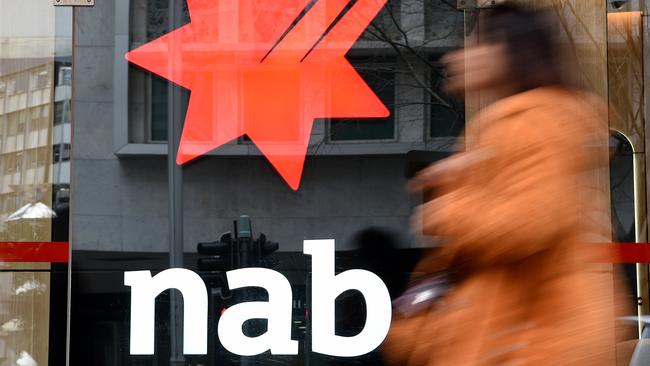
Eli Greenblat 7.53am: Woolies medical officer to tackle COVID
Supermarket giant Woolworths has appointed an inaugural chief medical officer to help guide the company through the new COVID-19 world in what is a first for a major retailer in Australia.
In an email to customers on Friday, Woolworths chief executive Brad Banducci said the supermarket chain had appointed Dr Rob McCartney to the Woolworths Group as its inaugural Chief Medical Officer.
“This will be a key role in helping us navigate how we operate our business in a COVID world, and of course to support us in keeping our teams, customers and supplier partners safe,’’ Mr Banducci said.
Dr McCartney has specialised in the field of occupational medicine for over 20 years.
Jared Lynch 7.44am: Mesoblast wins FDA panel support
ASX-listed biotech Mesobast has persuaded US Food and Drug Administration advisers that its new drug to combat COVID-19 is effective.
The Oncologic Drugs Advisory Committee (ODAC) voted 8-2 in favour of the therapy, which was developed to treat steroid-refractory acute graft-versus-host disease, which has a similar immune response seen in patients with severe complications from coronavirus.
But the FDA is yet to approve Mesoblast’s drug, remestemcel-L, and expected to make that decision by September 30. And while the FDA often heeds its committees’ advice, it isn’t obliged to do so.
“The ODAC is an independent panel of experts that provides advice and appropriate recommendations to the FDA based on potential issues highlighted by the FDA during their review of the efficacy and safety of marketed and investigational products for use in the treatment of cancer,” Mesoblast said in a statement to the ASX.
“Although the FDA will consider the recommendation of the advisory committee, the final decision regarding the approval of the product is made by the FDA solely, and the recommendations by the panel are non-binding.”
Mesoblast’s shares went into a tailspin on Tuesday, diving more than 30 per cent after the FDA raised questions about the effectiveness of remestemcel-L in briefing documents ahead of their meeting, which was held early Friday morning (AEST). It entered later entered a trading halt, pending the advisory panel’s vote.
The company’s shares have had a stellar run in past months, rising more than 323 per cent, largely due to the success of its drug remestemcel-L, which has been trialled in the US on patients with serious COVID-19 complications.
6.20am: ASX to edge lower
Australian stocks are set to open slightly weaker, after Wall Street ended mostly lower, despite a fall in the number of Americans applying for unemployment benefits.
Around 6am (AEST) the SPI futures index was down four points, or 0.1 per cent.
On Thursday, the ASX closed down 0.67pc, with losses led by Telstra after earnings disappointment.
The Australian dollar was lower at US71.45c, down from US71.63c.
6.10am: Wall St mostly lower despite jobless fall
US stocks slipped after data showed fewer Americans applied for jobless benefits, potentially signalling that the pace of recovery in the labour market is starting to pick up.
The S&P 500 dropped 0.2 per cent as of the 4pm close of trading, still remaining close to its first record since the coronavirus pandemic disrupted the economy. The index had risen in eight of the past nine sessions through Wednesday, when it eclipsed its closing record in intraday trading but pulled back before the session ended.
“I could say I’m not surprised, and give you all the reasons why it happened, but I think everybody is surprised by it and how quickly it happened,” Shawn Snyder, head of investment strategy at Citi Personal Wealth Management, said of the approaching record on the index.
It has been only 123 trading days since the S&P 500 set its last closing record on February 19. A new high would be the fastest recovery from a bear market on record. Moreover, in the 100 trading days since the March 23 lows, the index is up 51 per cent. That is the best 100-day spurt since 1933.
The Dow Jones Industrial Average dropped 0.3 per cent, or 80 points, while the tech-heavy Nasdaq Composite Index rose 0.3 per cent. Overseas, the pan-continental Stoxx Europe 600 fell 0.6 per cent.
Initial jobless claims fell to 963,000 in the week ended August 7, ending a 20-week streak of results above one million. However, it is also more likely that the lay-offs occurring now are permanent, in contrast to the temporary lay-offs and furloughs at the onset of the pandemic.
Having weekly claims under 1 million is encouraging, said Lydia Boussour, senior economist at Oxford Economics, “but it’s still a painfully high number. We still have a labour market that is very impacted by this crisis.”
Investors are concerned that the expiration last month of the extra $US600 in weekly unemployment benefits is likely to leave less money in workers’ pockets and dent consumer spending, becoming a drag on the economy.
A standoff between politicians on a fresh stimulus package showed no signs of easing Thursday, and negotiations may be stalled until next month. House Speaker Nancy Pelosi said the two sides remain “miles apart,” and the Democrats would only resume talks if Republicans agree to spend significantly more than $US1 trillion.
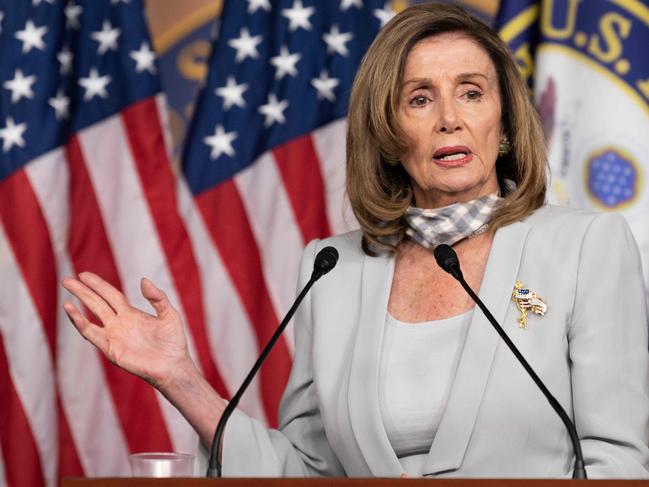
Federal Reserve officials on Wednesday once again urged the government to press ahead with additional spending to bolster the economy. San Francisco Fed President Mary Daly said additional relief to state and local governments would be important to prevent deeper cutbacks in services and lay-offs of public workers.
In commodities, gold rose 1.1 per cent to $US19656.70 a troy ounce as the volatility seen in recent days continued. This week’s stint of choppy trading paused a months-long rally that took the precious metal to an unprecedented high.
“We keep gold because there are still uncertainties, real rates are low, inflation may be higher than expected,” said Luc Filip, head of private banking investments at SYZ Private Banking. But the short-term potential for a rally in gold has now reduced, he said. He sold down part of his portfolio’s gold holdings two days ago to book profits.
US crude-oil prices fell 0.9 per cent to $US42.27. The International Energy Agency on Thursday projected a deeper rout in oil demand for 2020 than previously forecast because of the high coronavirus case numbers in several major economies.
In Asia, Japan’s Nikkei 225 rose 1.8 per cent after the central bank’s producer-price index, which measures manufacturing costs and inflation, came in above expectations for July. The Shanghai Composite Index and Hong Kong’s Hang Seng index were both essentially flat.
Dow Jones Newswires
5.45am: KLM freezes salary increases
Dutch national carrier KLM announced it was unilaterally postponing a 2.5 per cent salary increase across the board as the airline deals with massive losses due to the effect of the coronavirus pandemic.
KLM’s announcement comes as the airline said it was losing 10 million euro ($US11.8 million) per day.
“KLM is in a crisis of unprecedented magnitude since the outbreak of the COVID-19 virus,” it said adding “our half-year results for 2020 were the worst ever.” “To survive KLM must take measures to lower costs,” it said, despite a 3.4 billion euro government bailout package being approved last month.
KLM and major aviation unions last year agreed to a long-negotiated 2.5 per cent increase in salaries, which was supposed to have been implemented this month.
“The situation then was totally different to what it is now,” the airline said, adding unions could not reach consensus about the postponement. Therefore KLM had no choice but to act unilaterally,” it said without giving a postponement date.
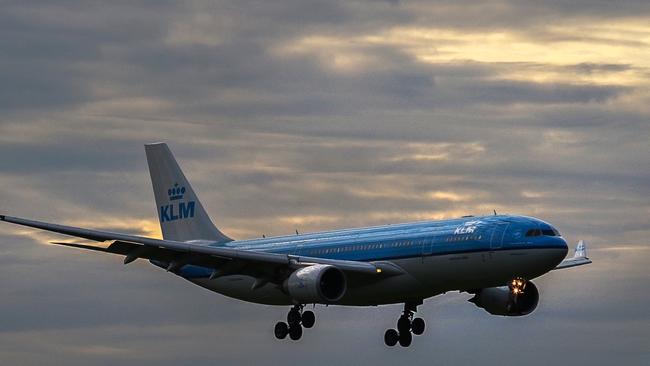
AFP
5.40am: Offer for bankrupt Speedcast
Australia’s Speedcast International. is seeking to sell itself out of bankruptcy to lender Centerbridge Partners for $US395 million, a proposal that could leave other top creditors of the satellite communications company unsatisfied.
Centerbridge committed to purchasing the Sydney-based company’s equity under a restructuring proposal that would divvy up the proceeds among Speedcast’s secured lenders, trade vendors and other creditors.
The equity commitment will be folded into a reorganisation plan that, if approved in court, would lift the company out of a bankruptcy stemming from the coronavirus pandemic and its impact on the global economy. Speedcast, which connects cruise ships and oil rigs to internet and phone services, faced a cash crunch when the pandemic severely curtailed tourism and oil transport.
The purchase price wouldn’t cover the $689 million debt load Speedcast brought with it into bankruptcy. The company entered chapter 11 in April short on cash and swiftly borrowed another $180 million in bankruptcy financing from secured lenders to keep operations running.
In court papers, Speedcast acknowledged that certain lenders may oppose the proposal and take the position that moving forward with Centerbridge amounts to a loan.
Dow Jones
5.35am: Europe stocks end lower
US stocks inched towards record highs following a drop in first-time unemployment claims and indications US politicians are still seeking common ground on an economic rescue package.
Data showed new weekly claims for unemployment benefits fell below one million for the first time since the coronavirus pandemic struck in March.
The 963,000 seasonally adjusted initial claims filed in the week ended August 8 came in below expectations.
Europe’s main stock markets failed to get any traction from the US jobs data and ended lower. London lost 1.5 per cent, Frankfurt was down 0.5 per cent and Paris declined 0.6 per cent.
Traders have been betting on US politicians eventually agreeing on a new pandemic recovery deal despite long-running animosity between Democrats and Republicans.
Both sides are blaming each other for the lack of movement, with Treasury Secretary Steven Mnuchin saying that House Leader Pelosi would not budge unless a Democrat demand for spending of at least $US2 trillion is met.
That is well down from the $3.5 trillion initially proposed by Democrats but Republicans say they are unwilling to shift from their $1-trillion plan.
There is also a focus on this weekend’s US-China talks to review their trade pact signed in January. There have been concerns that rising tensions between the superpowers could scupper the agreement, which ended, or at least called a truce in a painful and long-running trade war that battered the global economy.
But top officials on both sides have expressed confidence the deal will be kept in place and analysts said there was little desire from either side to scrap it.
Earlier in Asia, investors had struggled to maintain momentum following a strong start.
Oil prices edged lower, as the International Energy Agency cut its 2020 forecast for global oil demand to 91.9 million barrels per day, the first downgrade in a number of months.
“By December 2021, global oil consumption will still be two per cent lower than at the end of 2019,” the IEA said.
AFP
5.32am: Cartier ad derided in China
French luxury brand Cartier is facing online mockery in China over a Valentine-themed advert which appears to show a gay couple who are described in a caption as depicting “father-son” love.
Cartier posted a video on Chinese social media platform Weibo this week promoting its “Trinity” ring, which the brand described in the video’s caption as representing the “bond of love” — ahead of the late-August Qixi Festival, one of China’s traditional Valentine’s day equivalents.
The video showed groups of people laughing and embracing each other, including a man and a woman holding hands, two women lying on the ground together, and two young men riding bicycles while wearing matching rings.
The English tagline asks: “How far would you go for love?” Many viewers interpreted the video, which didn’t specify the relationships between the people depicted, as showing gay and lesbian couples alongside a heterosexual couple.
The top comment on Cartier’s Weibo post was a user who said “I feel like this supports LGBT”, to which hundreds of other users responded with messages of support and praise as well as pride-flag emojis.
But a caption published by Cartier’s online store on Alibaba’s Tmall platform under a photo of the same two men prompted confusion and ridicule, especially as the pair appeared to be a similar age.
The caption, which read “father and son, bound by love, enjoying life’s journey”, was “inconsistent” with the romantic photograph, users on popular online forum Douban complained.
Online content in China, especially content depicting LGBT people, is subject to heavy and often arbitrarily applied censorship. In recent years, censors have muted discussions on social media, banned homosexuality in films and even prevented the sale of rainbow-themed items online.
But Cartier’s apparent caution has backfired. “Ahahahahaha,” one Douban user wrote, “gay love has been turned into incest.” “If they’re father and son, why are they buying matching rings?” another asked. “So unnecessary!” commented one LGBT-focused Weibo account.
In a statement, Cartier said it had launched a movie in China with four independent stories depicting “romantic, friendship or family love”.
AFP
5.30am: SA mining output plummets
South Africa’s mining output fell 28.2 per cent year-on-year in June, the country’s statistics bureau said, edging up only slightly as the coronavirus pandemic continues to hamper economic activity.
In May, production was down 29.8 per cent from 12 months earlier. Major drops were seen in the platinum group metals as well as iron ore and coal, according to StatsSA.
Mineral sales also decreased by 14.2 per cent year-on-year in June with the biggest drops in gold, followed by coal, other nonmetallic minerals and platinum group metals.
AFP
5.29am: New US jobless claims drop below 1m
The US Labor Department reported fewer than one million new weekly claims for unemployment benefits filed, for the first time since the coronavirus pandemic struck in March.
The data showed 963,000 seasonally adjusted initial claims filed in the week ended August 8, below expectations and a drop of 228,000 from the previous week.
The insured unemployment rate dropped 0.4 percentage points to 10.6 per cent in the week ended August 1, the latest week such data was available, with about 15.5 million people receiving benefits.
The number of people receiving benefits under a special program for those not normally eligible also decreased by more than 167,000 to 488,622 in the week ended August 8.
All told, nearly 28.3 million people were receiving some form of government aid in the week ended July 25, down more than three million from the week prior.
Yet that was many times above the 1.7 million people receiving benefits in the same week of 2019, indicating the damage done by lockdowns to stop COVID-19 that began in mid-March.
AFP
5.25am: US holds off on extra EU tariffs
Washington said it would hold off on its threat to impose higher tariffs on $US7.5 billion worth of EU goods in its long-running dispute over subsidies to European aircraft maker Airbus.
Last year the World Trade Organisation authorised the US to impose tariffs of up to 100 per cent on $US7.5 billion in European goods.
Washington then slapped 25 per cent taxes on a number of EU products including whiskey, wine, cheese and olives. A 10 per cent tariff on Airbus planes was increased to 15 per cent in March.
The European Union last month said it had brought itself into compliance with WTO rulings and called for the tariffs to be lifted.
Washington said Wednesday the bloc had not done enough but signalled it was willing to seek a solution.
“The EU and member states have not taken the actions necessary to come into compliance with WTO decisions,” US trade representative Robert Lighthizer said in a statement.
“The United States, however, is committed to obtaining a long-term resolution to this dispute.
“Accordingly, the United States will begin a new process with the EU in an effort to reach an agreement that will remedy the conduct that harmed the US aviation industry and workers and will ensure a level playing field for US companies.” In June it had threatened to levy tariffs on another $US3.1 billion in EU goods as it has been authorised to do under a WTO ruling.
AFP
5.20am: Chinese diners told to order less
Chinese diners are being told to order less food as part of a campaign by President Xi Jinping to tackle waste and embrace thrift.
“Operation empty plate” aims to overturn the ingrained cultural habit of ordering extra food for group meals.
Xi was quoted in state media this week as saying food waste is “shocking and distressing,” adding it was “necessary to maintain crisis awareness regarding food security”.
“This year’s impact of the coronavirus pandemic has further sounded the alarm for us.” Regional catering groups responded to Xi’s call by embracing a so-called “N-1 policy” — urging groups of customers to order one dish fewer than the number of diners at a table.
The campaign also suggests restaurants serve smaller or half-portions for lone diners.

AFP

